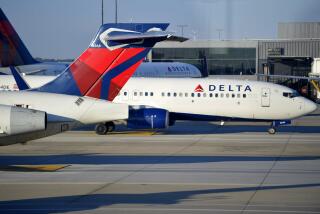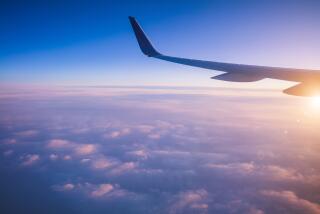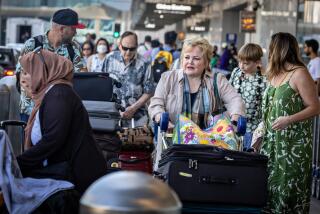Passengers at Stake : Airlines Try to Outthink Terrorists
- Share via
NEW YORK — Capt. Brian E. Sweet was anxious.
His British Airways 747 jumbo jet was soon to leave the gate at Detroit’s Metropolitan Airport. The plane had been searched once already this day, after a telephoned bomb threat at its previous stop in Toronto. Nothing had been found.
But Sweet, who had taken command of the plane in Detroit, ordered a second search. All of the baggage was unloaded; Wayne County sheriff’s dogs sniffed for explosives; passengers had to get off the plane, go down to the Tarmac and identify every piece of luggage.
Again, nothing was found. But, because of the search, the flight was 3 hours and 7 minutes late getting off the ground.
People Are Frightened
As the incident illustrates, airlines are going to unprecedented lengths to bring terrorist hijackings and bombings to an end. People are frightened and many have stopped traveling by air. As a result, the airlines are suffering economically and are doing all they can both to protect themselves and to reassure their passengers that it is safe to travel.
So scenes like the one in Detroit are taking place almost daily.
While it is true that the airport screening methods in effect since 1973 have foiled many hijackings and other terrorist acts, they appear not to have been enough. (According to the Federal Aviation Administration, 7 billion passenger searches have been conducted since 1973. In that time 34,000 firearms and other weapons have been confiscated and there have been 14,000 arrests.)
One Step Ahead
The latest toughening of security measures has been in proportion to the perceived threat, airline officials say, and the purpose is to stay one step ahead of terrorists--to outthink them.
As a result, Americans headed overseas this summer can expect to be examined closely at airports both in this country and abroad.
On each international flight, there will be as many as three searches of carry-on and checked luggage. In addition to having to pass through a metal detector, passengers might be frisked by hand or with an electronic hand scanner, also possibly more than once. And most travelers will have to answer some personal questions before they get on the plane.
Three airlines--People Express, Pan American World Airways and Trans World Airlines--have begun charging $5 a passenger to defray the costs of the added security measures. According to airline officials, passengers are not objecting to the fee or to any of the new procedures.
Often, the passengers do not know that they are being investigated. “There is much security that is covert,” Robert T. Bauter, Unit ed Airlines’ manager of corporate security, said. “Checked baggage is screened discreetly. People don’t know about it.”
Although United does not fly to the places that have been in the spotlight recently because of terrorist activity, it has strengthened security procedures on its Pacific routes.
No one is immune from the newly intensified scrutiny. Pregnant women will be examined. Infants and small children (a .45-caliber revolver was once smuggled onto a plane in a diaper) will also be checked closely.
Some of the “passengers” milling around departure gates at both U.S. and foreign airports may actually be undercover agents of the Federal Aviation Administration. Airplanes are being guarded around the clock. Cleaners and food service employees are being frisked every time they board an aircraft. Guards are standing watch at airline food kitchens.
FAA Sky Marshals
The number of armed, plainclothes FAA sky marshals aboard U.S. airliners has been greatly increased, although the agency will give no numbers or other details. Flight crews have received special training in preventing terrorist activities. The technology used to uncover weapons and explosives is being improved.
“Airline security is at a level of intensity heretofore unmatched,” said Richard F. Lally, assistant vice president for security of the Air Transport Assn., the industry trade group. “They are going all out, especially in what might be considered high-risk areas--Europe and the Middle East. The security measures . . . (cover) the airplane itself and everything that comes to it--fueling, catering, cleaning, cargo, baggage, passengers and even duty-free items.”
But despite all the effort, holes still exist. On several occasions recently, representatives of the CBS television news program “60 Minutes” were able to penetrate security at several airport locations. Some were even able to get jobs--without their background being checked--with private airport security firms. The exercise showed that people with unsavory records--possibly terrorists--could get into “secure” airport areas and even work there.
Continuing Vulnerability
The drastic security measures that have been taken, as well as the continuing vulnerability, can be observed at New York’s three major air terminals. Airport police cars are being equipped with shotguns. “Decoy” detectives--dressed and acting like passengers or airport and airline employees--patrol terminals. If a suspicious-looking package or piece of luggage is found, an emergency mobile X-ray van is available to check it out.
But one of the airports, Kennedy International, still appears to be an easy target for terrorist activity. Its 4,930 acres are bordered on three sides by Jamaica Bay, which opens into the Atlantic Ocean. To fully protect Kennedy, said Henry I. DeGeneste, police superintendent for the Port Authority of New York and New Jersey, “You’d have to build a glass dome over it.”
“There is no such thing as perfect security,” John Mazor, a spokesman for the Air Line Pilots Assn., conceded. “Any terrorist who is sufficiently committed, has sufficient training and resources is going to penetrate the best security systems in the world. He may not do it every time, but if he keeps trying, he will get through.”
Sacrifice Many Comforts
But the stepped-up effort to minimize the dangers is in full swing and passengers are often experiencing inconvenience and delay. They are having to sacrifice many comforts--and some of their rights. “The public has accepted the basic element of involuntary search even if it is in violation of the Fourth Amendment,” John Steele, TWA’s director of security, said. “People are more concerned about security than they are about their constitutional rights.”
While some foreign airlines, most notably El Al, the Israeli carrier, have long insisted on stringent security procedures, American companies have been relatively slow to initiate them and lax in enforcing them.
But ever since the hijacking of TWA Flight 847 last June, when 39 persons were held hostage in Beirut for 17 days, Americans have paid more attention to thwarting such acts. Then, the bombing of TWA Flight 840 on April 2, in which four people were killed, once again accentuated the vulnerability of aircraft and the fact that airlines were paying little more than lip service to security.
Business Fell Sharply
The business of the U.S. carriers, especially those that fly overseas, fell off sharply. Something had to be done. And it was.
Examples of the new security measures abound.
One major anti-terrorist tactic employed by the airlines involves what is called a “profile” of potential terrorists. Such profiles have been used for some time but more attention is being paid to them now. By using a terrorist profile, security agents are able to determine whether a prospective passenger has certain characteristics that have been common to terrorists in the past.
Airline security officials do not like to discuss the elements of the profiles. But a series of interviews produced the following information:
Terrorist Profile
The most likely people to fit a terrorist profile, and thus to receive extraordinary scrutiny, are young, Arab-looking males. And if such an individual has a passport issued by a Middle Eastern country with which the United States has poor relations--Libya, Syria or Iran, for example--a bell figuratively goes off.
Airline security officials say that the process begins when reservation calls are analyzed for any unusual travel plans or suspicious conversation by prospective passengers. All airline employees, from reservations clerks to those at the gate are on the lookout for unusual characteristics.
The fact that members of a particular ethnic group are being watched closely sometimes creates uncomfortable situations.
He Was ‘Arab-Looking’
Recently, for instance, a Lebanese man was put under extra surveillance just because he was “Arab-looking.” After his Pan Am jet left the departure gate--but before it took off--he disobeyed the seat belt rule and began pacing up and down the aisle of the plane. A flight attendant ran to the cockpit and told the pilot that the man was making her “nervous.” The pilot taxied the plane back to the gate, where agents took the man off the plane and questioned him.
The man, who turned out to be a reputable Lebanese businessman, had a strong fear of flying and was trying to walk off his nervousness.
If a person has an American passport, an American airline is much less likely to consider him or her a potential terrorist. Other countries have the same kind of bias in favor of their nationals.
Descending Order of Threat
For example, Israel’s Shin Bet, the equivalent of the CIA, is responsible for the security of all El Al facilities. Its “calculated risk” profile has a descending order of threat: The lowest level of suspicion attaches to Israeli citizens. Jewish passengers from other countries are next. Others are searched much more thoroughly.
Airline security experts acknowledge that some people are perceived as posing little or no security threat. “We work partly on exception,” said Homer A. Boynton, a former FBI official who is now American Airlines’ assistant vice president for security. “If we have a frequent flyer who has logged 50,000 miles on American, we don’t give him the kind of scrutiny others might get.”
Airline travelers are also being asked a lot of questions, some quite personal. Some questions are aimed at determining whether they are being duped into carrying dangerous materials without knowing it:
--”Where are you going and what is the purpose of your trip?”
--”Who packed your bag?”
--”Are you carrying anything for anyone else?”
Pregnant Irishwoman
Security people say that the answers a pregnant Irishwoman gave at a London airport earlier this year, and the undisclosed way she matched the profile, made them suspicious of her. Asked where she was going, she said she was headed to Israel to get married.
However, security people thought it was unusual that her fiance was not accompanying her on the trip; she said he would follow later. The fact that she had only the equivalent of about $65 with her also made her suspect. Ten pounds of plastic explosives were found beneath the false bottom of her suitcase; she was carrying it unwittingly for her Arab fiance.
“If a person answers in a funny way (during initial security procedures),” an official of Pan American said, “a notation is made on his boarding pass and he is given a secondary--more intensive--search at the departure gate.”
Like British Airways, all carriers are insisting that no luggage remain on a departing plane unless the passenger who checked it in has actually boarded.
Frequently these days planes are delayed so that baggage can be unloaded when the computer shows that a passenger has not shown up even though his baggage is on board. Most of the time, the missing passenger is not a terrorist but is innocently in the restroom or in a duty-free shop or restaurant and does not hear the announcement. Some of them, also, prove to be people who are not fluent in English and could not understand the announcement. American Airlines’ Boynton says this happens at least three times a week at his airline’s terminals throughout the world.
In the past, most airlines trusted their own employees and allowed them to circumvent the X-ray and metal-detector equipment. But now, the rules have been tightened up by some carriers.
Western Airlines, for example, has begun requiring its pilots and other flight crew members to be examined, according to Glen Littrell, acting director of security for the airline. Besides going to what it calls 100% screening, Western also has strengthened its security force by 15% and occasionally tests screeners by having undercover agents attempt to smuggle contraband past them.
Parked Aircraft
All of the airlines have also strengthened security around their planes when they are parked overnight at airports. At least one guard is used per plane but some airlines have more. Eastern Airlines, according to Ernest Dunham, director of security, places two guards on the ground and another inside planes at foreign airports.
American Airlines officials said they have hired former security officials of El Al as consultants and that on July 15 they will put into effect new procedures based on those of the security-conscious Israeli carrier. It plans to improve the sophistication of the terrorist profile it uses and is also posting “security coordinators” at the six overseas cities it serves and at its American gateways, Dallas and Chicago.
Technological advances are also on the way to help prevent bombings of airplanes. Although metal objects show up on X-ray machines, plastic explosives do not. But now a Canadian company, Sciex MDS Health Group, has developed a “sniffer” system to uncover explosives that might otherwise go undetected.
Sniffing Out Explosives
The device, called Condor, is being tested by British Aerospace and British Airways. Previously, trained dogs have been used for the task of sniffing out explosives but Sciex MDS officials say the device is superior because the animals have limited powers of concentration.
Airlines and private investigators say that there is much that travelers can do to protect themselves.
Mike Ackerman, a Miami Beach, security consultant, advises passengers to regularly “clean” their passports by getting new ones. If a plane is hijacked, he said, it would be better if the hijackers cannot find out where a passenger has traveled previously. Arab hijackers, for example, have given rough treatment to passengers whose passports show that they have been to Israel.
Things to Leave Behind
He also urged travelers to leave at home their Police Benevolent Assn. membership cards, obtained by donors to such associations--”or . . . (hijackers) will think you are a cop.” He added that it is not smart to carry business cards “that identify the traveler as the head of the missile division of a prominent defense contractor.”
Also, some reading material should be carried only in checked baggage, he said. It would not be a good idea, he said, for travelers to the Middle East to have with them on the plane a copy of the biography of former Israeli Defense Minister Moshe Dayan, for example.
It is difficult to tell whether airline security people are more watchful or more jittery as a result of the current tensions. One recent incident illustrates a bit of both.
At the American Airlines terminal at Washington National Airport, a metal suitcase was observed unattended. Security forces called for sniffer dogs, which indicated that there might be an explosive inside. The FBI was summoned. It was decided to take the suitcase to the end of a runway and blow it up.
But then a security officer who had gone off somewhere returned just in time to reclaim his property.
More to Read
Sign up for Essential California
The most important California stories and recommendations in your inbox every morning.
You may occasionally receive promotional content from the Los Angeles Times.










